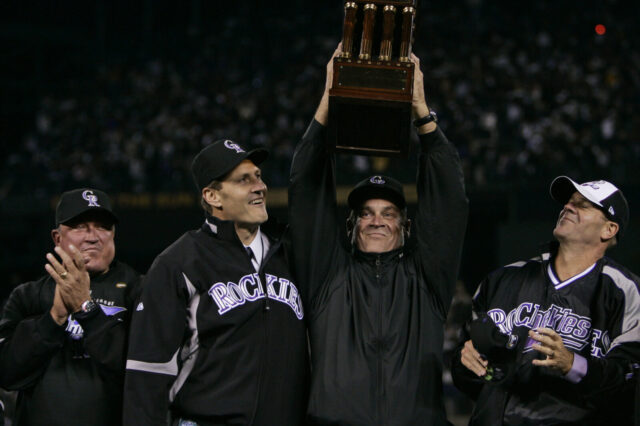When I was young, I was of the naive belief that the Hall of Fame for Major League Baseball consisted of universally agreed upon players that ought to be celebrated.
I didn’t know the ugly history revolving around how long it took players like Buck O’Neil to get in. I didn’t know that the politics and perception of those in charge mattered more than the stats and measurable contributions to the game.
I didn’t realize that even the moniker “baseball Hall of Fame” was a bit misleading.
Players, managers, GMs, and owners have no say at all when it comes to who gets this prestigious honor, and neither do the broadcasters who cover the game on a daily basis or the vast majority of writers who tell the tales of the boys of summer.
It is in fact, the BBWAA Hall of Fame.
The Baseball Writers’ Association of America is a relatively small group of people selected by an even smaller group of people, and they determine not only the Hall of Fame but things like MVP, Cy Young, and Rookie of the Year.
You might think, as I once did, that given how seriously most of the baseball world sees these honors, there might be some rules or guidelines or structure in place in order to make sure that each member is exercising good judgment when voting. But there isn’t. And this has been made all too clear.
In recent years we’ve seen everything from stories about BBWAA voters having not attended games for years, being full time media members in other sports, and being completely out of the loop when it comes to what’s actually going on in baseball.
We’ve seen ballots that completely lack any internal logic, ballots clearly cast with an enormous hometown bias, and empty ballots which end up being counted as a vote against every single person eligible.
If you’re a Rockies fan, you’ve felt the sting of the decade-long fight over Larry Walker that barely saw him get in at the last possible moment by the thinnest of margins.
You were there when Todd Helton, Matt Holiday, and Nolan Arenado got absolutely robbed of MVP awards. You saw when Troy Tulowitzki didn’t win Rookie of the Year or a Gold Glove after a 31-DRS season. You watched most recently when Nolan Jones couldn’t even get nominated for RotY despite putting up the best game-to-game WAR of any rookie in the National League.
This offseason, you’ve endured multiple high-profile voters submitting half-empty ballots that include votes for Jimmy Rollins (47.6 WAR) and not Helton (61.8 WAR).
This all happens because the people voting aren’t actually required to watch, do any research, or in any way justify their votes.
Perhaps the most blatant and egregious example of the BBWAA collectively overlooking everything they claim the Hall of Fame is supposed to be about was when, after years of not voting for Barry Bonds and Roger Clemens, David Ortiz was sent straight through.
Regardless of how you feel about steroids, this is the definition of hypocrisy. Both Ortiz and Bonds are known to have used performance enhancing drugs, so if that is an automatic disqualifier, then neither should be in the Hall.
But if we are going to ignore the drugs, then Bonds was ten times the player Ortiz was. He just had a far more contentious relationship with the media. And so, the Hall does not showcase the best player of the generation but does celebrate a player who was far inferior and also cheated but was nicer to the voters.
Again, because there are no real guidelines beside “if you are a member, then whatever you feel goes” there is no methodology for pushback against these clearly nonsensical conclusions.
This is why both institutions, the BBWAA and the Hall of Fame, have lost a ton of credibility in the eyes of the average baseball fan.
There is no transparency in the process. Everything from who even gets into the BBWAA in the first place, to who gets picked to vote on awards, to who might be removed from the organization for any reason… it all takes place in the shadows with fans having nothing but hope that those in charge are acting on good faith. But when you see the end results, it’s clear that they are not. At least not all of the time.
Even long-tenured writers who produce columns instead of daily features but cover the game every day get blockaded while people who haven’t watched a game in years continue to exert their power.
Instant replay across sports has arisen in the digital age because fans can now clearly see on their TV that the call was wrong, and we demanded mechanisms be put in place so that it can be overturned and get it right. No longer is it acceptable for those in charge of enforcing the rules to operate under the mentality of “what I say, goes.”
But that is exactly how the BBWAA still operates.
To be clear, the majority, maybe even the vast majority, of BBWAA members and voters (you have to have been a member for 10 years to vote for HoF) do operate with consistency and integrity.
Most who didn’t vote for Bonds also didn’t vote for Ortiz. But there are enough voters who decided that nothing else mattered but their own personal feelings to ultimately make the difference between who got in and who didn’t. And there’s nothing to stop them from doing that.
In recognition of all of this, I’ve seen some fans suggest that perhaps someone else should create their own Hall of Fame, and their own awards. We do have other institutions that do this on some level. The Fielding Bible folks have their own methodology and their own awards, given out completely independently of Gold Gloves.
One proposed solution has been to simply include former players, coaches, and GMs. Y’know, the people who actually understand the game on a fundamental level and have first-hand knowledge and experience? How about including the broadcasters who are typically much closer to what’s going on inside the lines than the writers? But the BBWAA has long balked at such talk. They aren’t giving up their power as the sole arbiter of these prestigious honors.
Can someone else rise up and create a Hall of Fame with consistent logic? Sure. Will they? Remains to be seen. But the more light is shined on the current process, the more people lose faith in the mantra.
“Trust us, we know what we’re doing.”
Fans aren’t buying it anymore.



